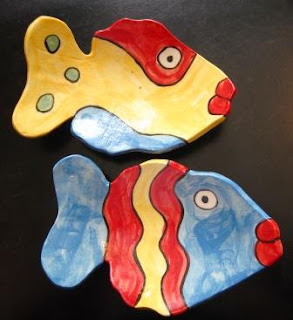 |
| John Watson's school of fish |
Saturday, January 5, 2013
Fish Magic - new sculptures by John Watson
Wednesday, January 2, 2013
Summertime Blues - new work by Jude Maisch
 |
| Ceramics by Jude Maisch |
Jude Maisch's new work is in the double window in
January. She has called this collection "Summertime Blues".
It is a continuation of her "Blue and
White" range, with a number of striking patterned platters taking centre
stage in the collection. Images of shells and waves hark back to childhood.
Summers of beaches and shell collecting. The floral and abstract motifs are
reminiscent of grandmother's tea-sets and patchwork rugs belonging to childhood
long and lazy Summers at the shack (long gone). |
| Platter by Jude Maisch |
Monday, December 10, 2012
New works by Kim Foale and NosMos
 |
| Cups by Kim Foale |
 |
| Salt bowls by Kim Foale |
This December, Off Centre features new work by members Kim Foale and creative team NosMos.
Kim Foale lives in the hills in the Southern Midlands
surrounded by dry sclerophyll forest. Foale takes inspiration from the things
she sees every day and uses found objects to make marks in her work. Her
limited edition sclerophyll cups have been made using bark from tall blue gums
on her property.
 |
| "Off with the Fairies", watercolour by Rodney Alexander |
NosMos present 'The Birds and the Bees' - original native bird watercolours by Rodney James Alexander and collectable jewellery pieces by Hiedi Limebeer.
 |
| Bee brooch in cut black/cream acrylic resin by Hiedi Limebeer |
 |
| Blackwood wren brooch by Hiedi Limebeer |
Labels:
ceramics,
jewellery,
Tasmanian wildlife art
Monday, December 3, 2012
Free Range: glass by Andrea Harris
The
hens are laying well this season. And
what is one to do with all those eggs?
My
glass is functional, safe to eat from.
It’s created with a love of the medium – glass lets in light, it lets
light pass through, it bends the light as it passes. Glass is a super-cooled form of
silica. A super-cooled liquid is a
metastable liquid that has been cooled below its melting point. Which make glass cool. Super cool.
Glass.
Late night trading at Off Centre during December
This year Off Centre will be open for late night Christmas trading at Salamanca Arts Centre on Friday evenings (7th, 14th and 21st December). Drop in after work, browse SAC shops and galleries, and enjoy free live music with Rektango in the courtyard. Only in December, so don't miss it!
Sunday, November 11, 2012
Gay McKinnon and Carolyn Toselli
 |
| 'Cubist Tic Tac Toe', fused polished glass, Gay McKinnon |
 |
| Ceramic fish platters, Carolyn Toselli |
Throughout November, check Off Centre's large gallery window for new glass and ceramics by Gay McKinnon and Carolyn Toselli. Gay McKinnon's playful glass games, blocks and platters exploit the brilliant colours and tactile qualities of kiln-formed polished glass while referencing the artist's scientific background. Chromosomes, rock strata, geometric and intracellular forms all feature. Ceramic artist Carolyn Toselli presents colourful, boldly decorative functional ware, jewellery and animal sculptures.
 |
| Ceramic platter by Carolyn Toselli |
 |
| Fused glass jewellery by Gay McKinnon |
Thursday, November 1, 2012
Exhibition by Yulia Szalay
 |
| New ceramics by Yulia Szalay |
 |
| Crystalline glazed ceramics by Yulia Szalay |
Yulia writes:
'Crystalline glazing is a highly specialized, unpredictable, challenging and labour intensive process. For crystals to grow in the glaze all the necessary conditions need to come together with accurate heat control of the firing crystals. The kiln is first taken up to the glaze melting point (1280 - 1300 degrees Celsius) when it begins to flow down the surface of the pots.
At this point, crash cooling to 100 degrees Celsius is necessary to stop all the glaze running off the pots. This means that each piece needs to sit on a pedestal with a disc underneath to collect the excess glaze. From then on, the temperature is held fairly constant for 5-6 hours to enable the crystals to grow. Slight variations in temperature rise and fall during this time can create rings and haloes and different effects. Each firing produces different results, often many failures. Each piece is therefore unique and unrepeatable.
The different colours are created by using various metal oxides in the base glaze mix of zinc, silica and frit. Cobalt for blues, copper for greens, titanium for white, manganese for mushroom pink and so on.
The big part of the fascination to me is the mystery of never knowing what results will be achieved. When it works, it's 'Christmas' and it's magic!
 |
| Crystalline glazed ceramics by Yulia Szalay |
Subscribe to:
Posts (Atom)



